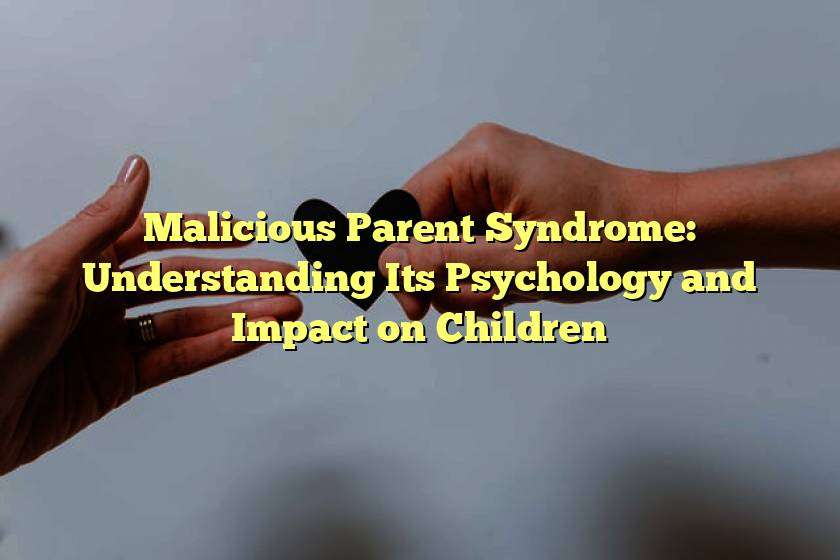As a parent, it is natural to want the best for our children. We want to protect them from harm and instill values that will serve them well as they grow into adulthood. However, some parents take their desire to control and protect their children to the extreme and engage in behaviors that can be harmful to their children’s emotional and psychological well-being. This pattern is known as Malicious Parent Syndrome.
What is Malicious Parent Syndrome?
Malicious Parent Syndrome is a term that was coined in the 1990s to describe parents who engage in behavior that is intended to harm their children. These behaviors can take many forms, including physical abuse, emotional abuse, neglect, and manipulation. Parents who exhibit Malicious Parent Syndrome have a deep-seated need to control their children and will go to great lengths to maintain that control.
The Psychology behind Malicious Parent Syndrome
To understand the psychology behind Malicious Parent Syndrome, it is important to look at the underlying beliefs and motivations that drive this behavior. Parents who engage in this pattern of behavior often have deep-seated insecurities that drive their need for control. They may have experienced trauma or abuse in their own childhood and are trying to exert control over their own lives by controlling their children.
Another underlying factor is a lack of empathy. Parents who exhibit Malicious Parent Syndrome often lack the ability to understand or respond to their children’s emotional needs. They may view their children as extensions of themselves and not as individual beings with their own thoughts and feelings. This lack of empathy can lead to a range of harmful behaviors, including emotional manipulation, gaslighting, and physical abuse.
Symptoms of Malicious Parent Syndrome
If you suspect that you or someone you know may be engaging in Malicious Parent Syndrome, it is important to be aware of the symptoms. Some of the common signs include:
- Physical abuse, including hitting, slapping, or spanking
- Emotional abuse, including verbal attacks, ridicule, or scapegoating
- Neglect, including failing to provide for basic needs, such as food, shelter, or medical care
- Manipulation, including gaslighting and emotional blackmail
- Control, including monitoring a child’s every move, controlling their social interactions, or micromanaging their lives
The Impact on Children
Children who are raised by parents who engage in Malicious Parent Syndrome may experience a range of negative outcomes later in life. These can include low self-esteem, anxiety, depression, and difficulty forming healthy relationships. Children may also struggle with attachment issues, which can affect their ability to form trusting relationships with others.
In some cases, the impact can be so severe that children may develop complex post-traumatic stress disorder (C-PTSD) as a result of their experiences. This condition can cause severe emotional and psychological distress and requires careful treatment by a qualified mental health professional.
Treatment Options
If you recognize the symptoms of Malicious Parent Syndrome in yourself or someone else, it is important to seek help. Treatment options may include individual therapy, family therapy, or even legal intervention in cases of abuse or neglect. The first step is to acknowledge that there is a problem and to take action to address it.
Conclusion
Malicious Parent Syndrome is a pattern of behavior that can have a devastating impact on children. If you suspect that you or someone you know may be engaging in this type of behavior, it is important to seek help. With therapy and support, it is possible to overcome Malicious Parent Syndrome and build healthy, loving relationships with your children.



